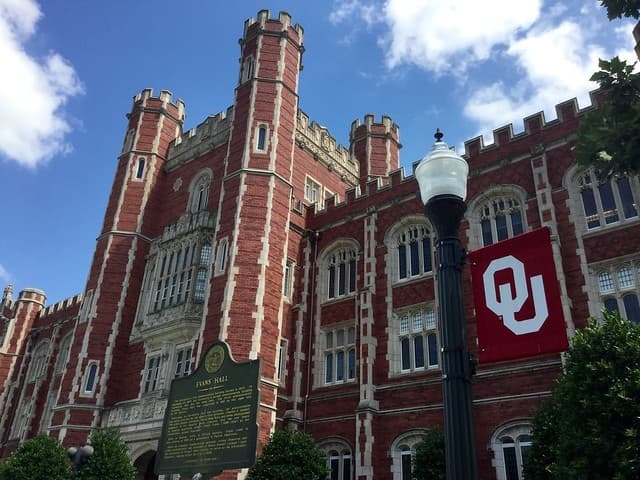
Higher Education
Mike Brake | June 16, 2020
Amidst growing scrutiny, OU closing Confucius Institute
Mike Brake
The University of Oklahoma will close its embattled Confucius Institute, a university spokesperson told OCPA. That news comes in the wake of yet another critical report on Chinese government propaganda and espionage activities channeled through such agencies, and of U.S. Sen. James Lankford’s legislation designed to expose financing and other activities related to the institutes.
“In March 2019, the U. S. Department of State conducted an inquiry into the Confucius Institute housed at OU and made certain operational recommendations,” OU spokesperson Kesha Keith said. “In that context, and against the backdrop of evolving programmatic, budgetary and managerial needs, and after requesting faculty input, the university took the necessary steps to begin closing the Confucius Institute.”
Keith said the contract governing the university’s relationship with the institute and its parent Chinese government entity requires a six-month phase out beginning on the date OU officials notified the Chinese government of the termination, which was April 10.
“In the meantime,” Keith said, “Confucius Institute staff are working to repatriate interns and visiting scholars and wind down the institute’s existing obligations. Where possible, the university will work to provide Chinese language and Chinese studies programs for OU students within existing academic structures.”
Confucius Institutes were among the many Chinese government operations abroad noted as propaganda and even espionage entities in a new report, “The Party Speaks for You: Foreign Interference and the Chinese Communist Party’s United Front System.” It was authored by Alex Koske of the Australian Strategic Policy Institute and details the operations of what the Chinese call the United Front Work Department (UFWD), a vast network of organizations and initiatives designed to spread and bolster Chinese influence abroad.
“The united front system’s reach beyond the borders of the People’s Republic of China (PRC)—such as into foreign political parties, diaspora communities and multinational corporations—is an exportation of the Chinese Communist Party’s (CCP) political system,” the report says. “This undermines social cohesion, exacerbates racial tension, influences politics, harms media integrity, facilitates espionage, and increases unsupervised technology transfer.”
One key component of the UFWD effort is the 100-plus Confucius Institutes lodged on American college campuses and within local public-school districts, including the University of Oklahoma. The FBI and the CIA have warned repeatedly that these institutes, which pose as educational enterprises focused on Chinese language and culture, are actually propaganda organs for the CCP and may in some cases also engage in espionage and theft of intellectual and technology property. Confucius Institutes have also been accused of spying on and monitoring Chinese students studying at American schools.
OU launched its Confucius Institute in 2006. The institutes are supposed to be funded in whole or in part by contributions from the Hanban, the agency of China’s Ministry of Education that manages them. However, as a 2018 OCPA investigation showed, OU and many other American schools had failed to report cash received from foreign sources as required by federal law.
When asked about those funds from the Hanban, the university said financial records related to the Confucius Institute were “maintained by the OU Foundation which is an independent not-for-profit corporation, and therefore not subject to the Oklahoma Open Records Act.”
Despite the often-murky financing that surrounds Confucius Institutes, their purpose is made clear in the Australian report.
Instructors in Chinese history paid by the Hanban are commonly caught whitewashing abuses of the CCP. Textbooks provided by the Hanban tell American students that Taiwan and Tibet are parts of China. A report by the National Association of Scholars called schools like OU “naïve” in allowing Confucius Institutes to occupy places on their campuses and engage in propaganda, potential surveillance of Chinese students and, in some cases, espionage and technology theft.
Now the Australian report adds credence to those concerns, noting that Chinese President Xi Jinping has emphasized and expanded the activities of UFWD agencies and operations.
It quotes the current UFWD director as saying that “the United Front is a political alliance, and united front work is political work. It must maintain the party’s leadership throughout, having the party’s flag as its flag, the party’s direction as its direction, and the party’s will as its will, uniting and gathering members of each part of the United Front around the party.”
In other words, the report indicates agencies like the Confucius Institute at OU existed to advance the goals and interests of the Chinese Communist Party and the totalitarian regime it manages.
In response to the Australian report, the House Republican Study Committee proposed a series of new initiatives to combat the UFWD’s influence. Among them were proposals to implement provisions of the Magnitsky Act of 2012, which permits sanctions against human rights violators, including banning them from the United States and freezing their assents.
Lankford, R-Oklahoma City, has also sponsored legislation to force host universities like OU to disclose provisions of their agreements to host Confucius Institutes and assure background checks on Chinese national faculty members recruited and sent to campus by the Hanban.
Mike Brake
Independent Journalist
Mike Brake is a journalist and writer who recently authored a centennial history of Putnam City Schools. A former reporter at The Oklahoman (his coverage of the moon landing earned a front-page byline on July 21, 1969), he served as chief writer for Gov. Frank Keating and for Lt. Gov. and Congresswoman Mary Fallin. He has also served as an adjunct instructor at OSU-OKC, and currently serves as public information officer for Oklahoma County Commissioner Brian Maughan.